YO HO HO is a forgotten 1981 film from Bulgaria, while THE FALL, a remake, is a 2006 American-Indian co-production that has likewise been largely forgotten. Both are interesting films, and deserving, I feel, of a joint analysis.
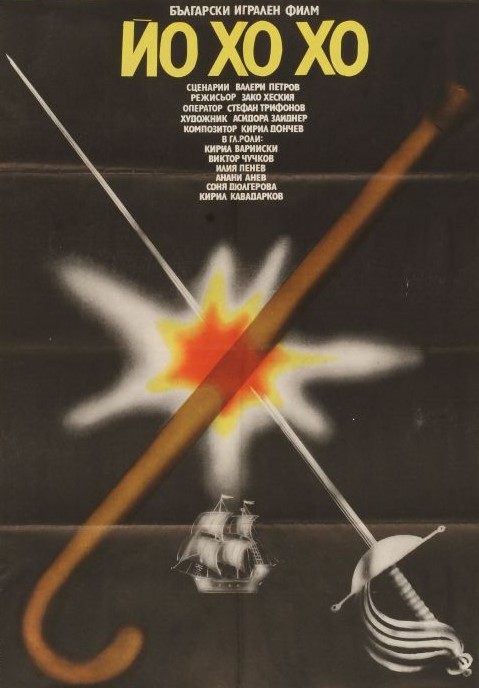 YO HO HO was directed by Zako Heskiya (1922–2006), a filmmaker known primarily for Soviet sanctioned war epics. Here Heskiya scaled down his approach for a more intimate treatment depicting the travails of a young boy named Leonid (extremely well played by future director Viktor Chouchkov). No, it’s not a kid’s movie, although that’s how YO HO HO appears to have been taken, with (judging by the online reactions) now-grown children being its most appreciative audience.
YO HO HO was directed by Zako Heskiya (1922–2006), a filmmaker known primarily for Soviet sanctioned war epics. Here Heskiya scaled down his approach for a more intimate treatment depicting the travails of a young boy named Leonid (extremely well played by future director Viktor Chouchkov). No, it’s not a kid’s movie, although that’s how YO HO HO appears to have been taken, with (judging by the online reactions) now-grown children being its most appreciative audience.
Leonid, stuck in a big city hospital due to a broken arm, falls under the spell of a paralyzed actor (Kiril Variyski, who’s nearly as strong as Chouchkov). The latter enraptures the boy with stories about the heroic exploits of a masked pirate, which we see enacted in cheap-looking dramatizations that mix indifferently photographed derring-do with rudimentary model work.
The pirate in those dramatizations inevitably reveals himself to be the actor. The hospital’s other patients, which include a rotund troublemaker (Iliya Penev), likewise appear as swashbucklers, and a sexy nurse (Sonya Djulgerova) doubles as a maiden in distress, with the fantasy world assuming the status of a barometer of the protagonists’ moods. Leonid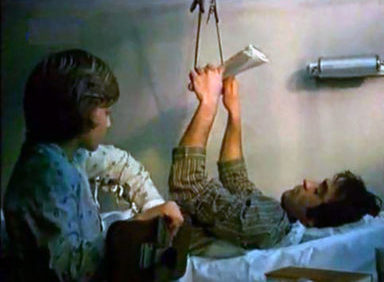 himself eventually joins the fantasies, just as elements from them come to color the here-and-now scenes.
himself eventually joins the fantasies, just as elements from them come to color the here-and-now scenes.
The disabled actor, meanwhile, is revealed to be far less heroic than he is in pirate guise, being a moody and temperamental sort who befriends Leonid primarily to get the boy to steal medicine. The actor plans to use it to OD and end his miserable existence, but, in an achingly obvious and predictable arc, it seems the man’s dabbles in make-believe are giving him a new lease on life.
The film overall is competent but far from exceptional in its staging and photography, being the work of a director who was evidently capable of far better. Again, though, the acting is stellar, with the young Viktor Chouchkov and much older Kiril Variyski forming a touchingly genuine bond.
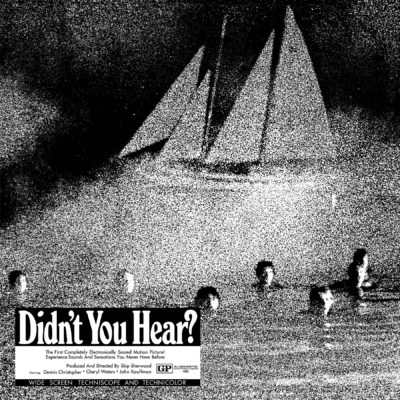 The resemblances to THE PRINCESS BRIDE, which also took the form of a dramatized story being told to a young boy, are undeniable, although what YO HO HO recalls more than anything else is DIDN’T YOU HEAR…, an ultra-obscure counterculture trifle from 1970. Featured was a young Dennis Christopher as an alienated college student who imagines himself and his best friend Gary Busey as blue jumpsuit-clad pirates. A cute chick invades Christopher’s dorm room one day as part of a sorority initiation, and so, like the nurse in YO HO HO, she joins the fantasy world, where Christopher and co. dock on a tropical island, invade the house of a square couple and have deep convos about topics like freedom, responsibility and death.
The resemblances to THE PRINCESS BRIDE, which also took the form of a dramatized story being told to a young boy, are undeniable, although what YO HO HO recalls more than anything else is DIDN’T YOU HEAR…, an ultra-obscure counterculture trifle from 1970. Featured was a young Dennis Christopher as an alienated college student who imagines himself and his best friend Gary Busey as blue jumpsuit-clad pirates. A cute chick invades Christopher’s dorm room one day as part of a sorority initiation, and so, like the nurse in YO HO HO, she joins the fantasy world, where Christopher and co. dock on a tropical island, invade the house of a square couple and have deep convos about topics like freedom, responsibility and death.
YO HO HO and DIDN’T YOU HEAR… may seem dissimilar in tone, but in fact they’re quite complimentary. Hard though it might seem to believe, YO HO HO actually passed for an art film in its native land, with a tagline, “This is a sensitive film about human solidarity filled with humor and poetry,” that could have doubled for DIDN’T YOU HEAR….
With that in mind it seems odd that Tarsem Singh, a.k.a. “Tarsem,” a prolific music video and commercial director who made his feature debut with THE CELL (2000), chose to attempt a straight, but highly portentous, remake of YO HO HO. Such an attempt at cinematic alchemy has been tried elsewhere with mixed results, most famously in Quentin Tarantino’s RESERVOIR DOGS (1992), which served as an uncredited remake of the so-so Ringo Lam thriller CITY ON FIRE (1987). RESERVOIR DOGS was successful (artistically, that is) in its aims because despite its highbrow trappings it didn’t pretend to be anything more than the 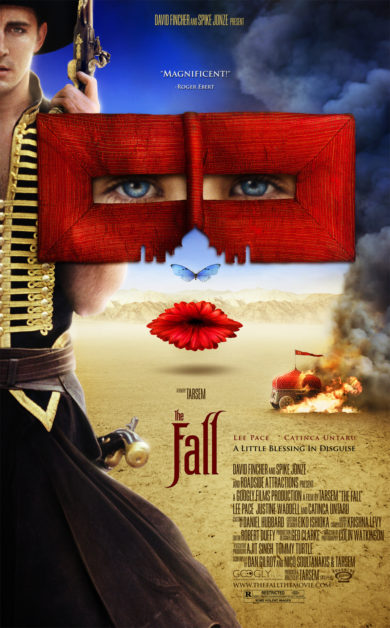 bloody caper movie it (and CITY ON FIRE) was. Ditto Martin Scorsese’s THE DEPARTED (2006), which in its Hollywood-ization the Hong Kong thriller INFERNAL AFFAIRS (2002) didn’t try to enhance the material.
bloody caper movie it (and CITY ON FIRE) was. Ditto Martin Scorsese’s THE DEPARTED (2006), which in its Hollywood-ization the Hong Kong thriller INFERNAL AFFAIRS (2002) didn’t try to enhance the material.
Contrast those films with THE WIZARD OF GORE (2007), adapted from the notorious 1970 cheapie by H.G. Lewis, who admitted he “didn’t understand” the more self-important remake, and CHLOE (2009), which tried to transcend the lame 2003 French thriller NATHALIE…. Those films failed primarily because their makers attempted to create magic from material that was perilously thin regardless of how much gloss was added. That was also the case with THE FALL, undoubtedly one of the most ambitious films of the aughts. Its 17 year production was filmed in 24 countries, with Tarsem attempting to create an ARABIAN NIGHTS for our time in a Beethoven scored film that owes a great deal to BARAKA (1992) in its many impossibly photogenic locations (there were no sets) and depictions of cultural rituals, which include whirling dervishes and the Balinese monkey chant.
Tarsem claims not to have viewed YO HO HO since its initial release, and bluntly refutes it in an early line of dialogue: “I don’t like pirate stories.” Nonetheless, YO HO HO has a definite connection to Tarsem’s film in the form of Viktor Chouchkov’s mother, who reportedly assisted in THE FALL’s music recording sessions. There’s also the fact that YO HO HO’s narrative arc is replicated quite faithfully, starting with the opening scene in which a paper airplane leads the injured protagonist Alexandria, a young migrant girl played by Romanian actress Catinca Untaru, to the crippled storyteller, in this case a movie stuntman played by Lee Pace who, in the highly lyrical slow motion-happy prologue, is crippled in a horse stunt gone wrong. Also carried over is the sexy nurse/fantasy maiden, here played by Justine Waddell.
The hospital setting was changed from the oppressive building of the earlier film to a more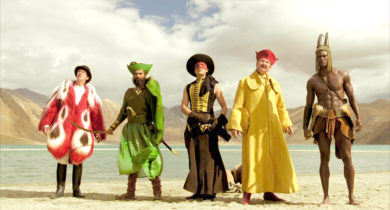 scenic 1920s-era institution, filmed on location in South Africa. The fantasies spun by Pace are infinitely more colorful and picturesque than those of YO HO HO, allowing Tarsem a heaven-sent chance to indulge his oft-criticized music video stylings, which actually work quite well here given the overtly unreal nature of the proceedings. So too the rather incongruous sight of Lee Pace, who’s best known for playing a convincing transsexual in SOLDIER’S GIRL (2003), as a manly hero; given the oddly colored scenery and heavily filtered visuals, he fits right in.
scenic 1920s-era institution, filmed on location in South Africa. The fantasies spun by Pace are infinitely more colorful and picturesque than those of YO HO HO, allowing Tarsem a heaven-sent chance to indulge his oft-criticized music video stylings, which actually work quite well here given the overtly unreal nature of the proceedings. So too the rather incongruous sight of Lee Pace, who’s best known for playing a convincing transsexual in SOLDIER’S GIRL (2003), as a manly hero; given the oddly colored scenery and heavily filtered visuals, he fits right in.
THE FALL’s trajectory is quite dark (reminding us that Tarsem directed THE CELL), with mass slaughter, a climactic slugfest and a nightmare sequence done with stop motion puppets, courtesy of the German animators Christoph and Wolfgang Launstein. Yet as in YO HO HO, the heart of THE FALL is the relationship between the two protagonists, powered by an absolutely extraordinary child actor performance. Catinca Untaru hasn’t done much acting-wise in the years since THE FALL, but she more than proved her mettle in a turn that’s consistently natural and free of standard kid actor affectations (although her heavily accented dialogue could have stood to be subtitled).
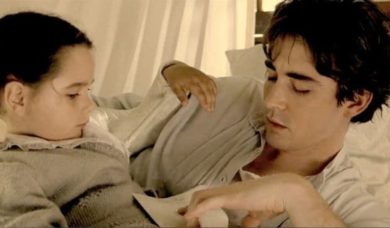 Alexandria’s bond with the stuntman is far more intense than the man-boy friendship of YO HO HO, and, frankly, a mite inappropriate (it’s impossible not to feel uncomfortable at the oft-repeated sight of these two sharing a bed). This has the effect of rendering the misconceived ending even more unsatisfying, as the relationship is never given a proper sending off; what’s provided, rather, is a disconcerting cut from Pace and Untaru in the hospital to the latter healed and working in the fields with her family, Pace having apparently gone back to doing stunt work.
Alexandria’s bond with the stuntman is far more intense than the man-boy friendship of YO HO HO, and, frankly, a mite inappropriate (it’s impossible not to feel uncomfortable at the oft-repeated sight of these two sharing a bed). This has the effect of rendering the misconceived ending even more unsatisfying, as the relationship is never given a proper sending off; what’s provided, rather, is a disconcerting cut from Pace and Untaru in the hospital to the latter healed and working in the fields with her family, Pace having apparently gone back to doing stunt work.
Thus we’re left with a diverting but underachieving original film and an equally diverting but vastly overblown remake, both of which are worthwhile-but-disappointing in equal measure. My advice? Watch DIDN’T YOU HEAR…, which isn’t any better than either (it’s considerably worse, in fact) but goes down much easier.
